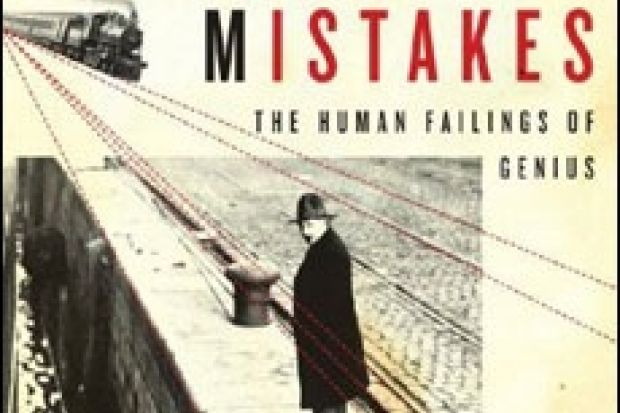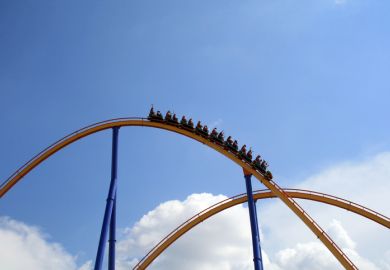It is common knowledge among physicists that Einstein made his share of mistakes. Two of these errors are staple themes of popular science books: his quixotic search for a unified theory of gravity and electromagnetism without using quantum theory, and the opportunity he missed to predict that the universe is expanding. As a result of these popular accounts, most people acquainted with Einstein's work view these errors as endearing blemishes in the otherwise brilliant career of a scientific saint.
There are already enough biographies of Einstein and far too many popular texts opportunistically linked to his science, so any author who proposes yet another book on him must make a strong case. Hans Ohanian, formerly an associate editor of the American Journal of Physics, has hit on the idea of focusing on Einstein's errors and thereby, perhaps, providing a corrective to the hagiographic tone of many of the accounts of his life. But this is not a new idea: three years ago, the great theoretician Steven Weinberg wrote an article in Physics Today, the house journal of American physicists, that had the same title as Ohanian's: "Einstein's mistakes".
Weinberg wisely began by putting his comments in context: "Albert Einstein was certainly the greatest physicist of the 20th century, and one of the greatest scientists of all time." The article did not pull its punches but was fair and thoughtful. Best of all, it was informed by a sense of how difficult it is to make real progress in science and to write up radically new ideas clearly soon after they have been hatched and long before further reflection and colleagues' criticisms have honed them into elegant concision.
But Weinberg did not attempt to be exhaustive, and it is smart of Ohanian to have seen that this could be the theme of an entire book. A glance at the bibliography and the references reveals that he has read an impressive amount of the Einstein literature. He writes fluently, with a good eye for a telling anecdote. The question is: does he have the knowledge and judgment equal to his subject, and does he have the humanity to focus on the blunders of a supreme thinker in a tasteful way?
It is soon clear, alas, that Ohanian is not the most generous of critics. When he comes to present the extraordinary papers that Einstein wrote in 1905, Ohanian says that this was not only "the year of miracles, it was also the year of mistakes" as "four out of the five famous papers he produced during that year were infested with flaws". While some of Ohanian's criticisms of these papers are justified, it seems to me that he does not understand Einstein's approach to the special theory of relativity, which did much to persuade physicists to modify their understanding of space, time, energy and mass. Nor is Ohanian always clear when he sets out his objections. He notes that Lorentz had written down the equation E=mc2 before Einstein, but that was in a particular application, to the theory of electrons. I continue to believe that Einstein was the first person fully to understand its meaning and, indeed, to have a modern understanding of special relativity.
Einstein's general theory of relativity is widely agreed to be the most impressive creation of any modern scientist. The English physicist Paul Dirac spoke for many when he remarked that the community would probably not have had this theory until decades later if it were not for Einstein's leadership. But this cuts no ice with Ohanian, who writes condescendingly of the difficulty Einstein had in casting his physical ideas in mathematical form and of how he "bumbled" his way to the correct equations. One of the foundations of the theory is Einstein's principle of equivalence - roughly speaking, the idea that observers cannot tell whether they are uniformly accelerating or in a uniform gravitational field. So far as I can see, Ohanian does not believe in this crucial principle.
He intersperses his carping with biographical sketches and with notes on the contributions of other leading physicists. Much of this is padding, but there is enough good anecdotal material here to demonstrate that Ohanian could write an appealing, popular book. But he is let down by his lack of empathy, his tendency to hyperbole and his inability to tell a story in a balanced way. He seems unable to relate any incident in Einstein's life without giving it a negative (or even poisonous) spin: the overriding impression given is that Einstein was a careless, skirt-chasing, money-grabbing, tax-dodging egotist. The charge of cupidity is particularly unfair. Except for his violin, Einstein cared little for material things and was anything but greedy, as founders of the Institute for Advanced Study learnt when they asked him to name his salary. Three thousand dollars a year, Einstein replied. The institute had in mind almost seven times that amount.
Having read almost 300 pages of Ohanian's mean-spirited commentary on Einstein's successes, the prospect of reading the author's account of the physicist's failed attempts to set out a unified theory of gravity and electromagnetism was almost too much to bear. "Publication of this junk was pathetic," Ohanian concludes with his usual grace.
For an incomparably more intelligent summary of Einstein's work in this field, readers would be better advised to go to the web and read Weinberg's article, which points out that Einstein's vision of a unified theory was in many ways ahead of his time. Moreover, as Weinberg notes, Einstein did not try to use his status to pressure others into following his lead - he simply wanted to be left alone to develop his ideas and "never tried to fill professorships at the Institute for Advanced Study with his collaborators or acolytes". Perceptive observations such as that are absent from Ohanian's odious effusions.
At the end of his account, after a thousand slights and insults, Ohanian declares that Einstein, despite his shortcomings, was "the pre-eminent physicist of the 20th century". But the belated slew of compliments won't wash. No one should take seriously an author who is so cavalier with invective, especially one who can write that Einstein had "no special insight into the workings of the universe".
Feeling slightly unclean when I finished the book, I reflected with pleasure on my conversations with the late Hungarian theoretician Nandor Balazs, one of Einstein's last assistants. Balazs did not try to hide Einstein's foibles - including his impatience with pestering journalists and autograph-hunters, his selfish pursuit of what would now be called "his own space" - but he stressed that Einstein was a man of exceptional kindness and generosity. So was he a saint?, I asked Balazs. "No," he replied firmly. "He was better than that - he was human."
Einstein's Mistakes: The Human Failings of Genius
By Hans C. Ohanian
256pp, £15.99
ISBN 9780393062939
WW Norton & Co
Published 29 September 2008
Register to continue
Why register?
- Registration is free and only takes a moment
- Once registered, you can read 3 articles a month
- Sign up for our newsletter
Subscribe
Or subscribe for unlimited access to:
- Unlimited access to news, views, insights & reviews
- Digital editions
- Digital access to THE’s university and college rankings analysis
Already registered or a current subscriber? Login




